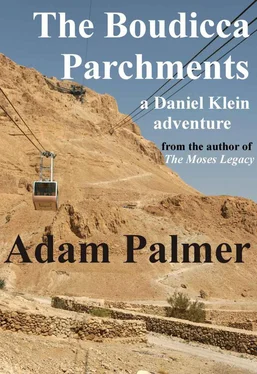Adam Palmer - The Boudicca Parchments
Здесь есть возможность читать онлайн «Adam Palmer - The Boudicca Parchments» весь текст электронной книги совершенно бесплатно (целиком полную версию без сокращений). В некоторых случаях можно слушать аудио, скачать через торрент в формате fb2 и присутствует краткое содержание. Жанр: Прочие приключения, на английском языке. Описание произведения, (предисловие) а так же отзывы посетителей доступны на портале библиотеки ЛибКат.
- Название:The Boudicca Parchments
- Автор:
- Жанр:
- Год:неизвестен
- ISBN:нет данных
- Рейтинг книги:3 / 5. Голосов: 1
-
Избранное:Добавить в избранное
- Отзывы:
-
Ваша оценка:
- 60
- 1
- 2
- 3
- 4
- 5
The Boudicca Parchments: краткое содержание, описание и аннотация
Предлагаем к чтению аннотацию, описание, краткое содержание или предисловие (зависит от того, что написал сам автор книги «The Boudicca Parchments»). Если вы не нашли необходимую информацию о книге — напишите в комментариях, мы постараемся отыскать её.
The Boudicca Parchments — читать онлайн бесплатно полную книгу (весь текст) целиком
Ниже представлен текст книги, разбитый по страницам. Система сохранения места последней прочитанной страницы, позволяет с удобством читать онлайн бесплатно книгу «The Boudicca Parchments», без необходимости каждый раз заново искать на чём Вы остановились. Поставьте закладку, и сможете в любой момент перейти на страницу, на которой закончили чтение.
Интервал:
Закладка:
But despite these measures and the obvious risks, some Israeli soldiers continued to hitchhike nevertheless, unofficially and inconspicuously. The army buses would normally take them as far as bus stops at major junctions and from there, they would make their way home using buses, on which they were allowed to travel free of charge.
So when Baruch Tikva saw the soldier walking along the road near the intercity junction, he knew that he was secretly hoping for a lift. He drove past at a slow speed and stopped just in front, opening the window and leaning towards the man on the asphalt pavement with a smile.
“Are you going to Mevasseret?”
He took a chance on getting it right. Naming a specific destination — a small township outside Jerusalem — would sound less suspicious than asking where he was going. If he got it wrong he could always loop around and try again with another soldier. But there was no need. Soldiers had been warned to watch out for tricks, like Arabs wearing Jewish-style skullcaps and playing Jewish religious music on the CD player. But you can’t beat appearance. Some Arabs can look like some Jews, and vice versa, but Baruch Tikva was pale-faced and so obviously of north European or north American ancestry that there was no way this soldier could doubt him.
“Yes.”
“Need a lift?”
“Yes… Thank you.”
Baruch pressed a lever to open the boot. The soldier threw his kit bag in the back and then got in the front seat, keeping his compact assault rifle. There were no doubts in the soldier’s mind when Baruch drove off in the promised direction. But within a few yards of where they had started, Bar-Tikva had whipped out a stun-gun, camouflaged as a mobile phone and given the soldier a ten second shock the torso that had left him barely conscious.
Realizing that a young fit soldier would probably not stay unconscious for long, Bar Tikva drove on, ignoring Mevasseret and looping back towards Motsa, a somewhat larger township outside Jerusalem. But instead of driving into Motsa, he stopped by the thick leafy trees by the entrance and finished off the job with a knife.
Then he got out, went round to the passenger side, hauled out the body and dumped it amidst the trees where it could not be seen from the road.
As he drove off and took the turning to Jerusalem, it was hard not to smile at how easy it had been. He would shed no tears over the dead soldier. Although the killing had been expedient rather than ideological, the fact was that the soldier had chosen to serve the evil Zionist entity. Even if he had been a conscript, he could still have refused. And he was obviously a Chiloni — a secular Jew and not a God-fearing one, with no commitment to Hashem and not in the least bit yiras shamayim .
The important thing to Bar Tikva was that he now had what he wanted: the assault rifle.
Chapter 71
“Okay, now remember,” said the Arab. “We must be careful… and very quiet. If anyone challenges us, let me do the talking.”
When Daniel and Ted had left Irene, she was full of excitement about what they had discovered. They had agreed to publish a joint paper which would combine Irene’s scientific analysis of the parchment, and the clay urn in which it was found, with the linguistic analysis of Daniel and Ted, as well as an historical overview.
But while Irene was excited enough about the translation and the link between the Temple Mount Parchment and the other discoveries at Arbury Banks and the Domus Aurea, Daniel and Ted were still not satisfied. Neither the magnitude of the discoveries, nor the contents thereof could explain why people were ready to go to such great lengths to silence them — especially earlier, when they did not have anything like as much information as they did now.
So Daniel had decided to take up Irene’s de facto challenge and try to gain access to the underground tunnels. Not the Jewish controlled tunnels outside the Temple Mount, dating to the seventh century CE, when the Arabs effectively raised parts of the Old City on arches and vaults to make access easier, but rather the tunnels built before the Arabs arrived, that extended from Solomon’s Stables under the Temple Mount itself.
As Irene had said, these tunnels and underground chambers were under the control of the Waqf — the Muslim trust that had control of the Temple Mount. And there was no way that they would let a Jewish historian venture into these tunnels. As far as the Waqf was concerned, anything that brought to light details of the pre-Islamic, Jewish association with the Old City of Jerusalem was something to be suppressed.
So Daniel had drawn on an old contact from his recent Egyptian adventure — a Nubian boatman on the Nile called Walid, who had a network of contacts even larger than Daniel’s quite formidable mental rolodex. When he first made the call, it was a long shot, but a long shot to nothing. Explaining what he wanted in Arabic, but holding out very little hope, he was pleasantly surprised when Walid confirmed that he could help and then put Daniel in contact with his fourth or fifth cousin once or twice removed.
So now here he was at night, on the Temple Mount, with Ted and a man called Salim who looked like he was in his eighties but was probably only in his seventies. The Levantine sun had tendency to age the skin and could make old people look older than they actually were in this neck of the woods.
The Temple Mount itself is the elevated area in the Old City of Jerusalem that houses the Dome of the Rock and the Aqsa Mosque, built in the seventh century of the common era by Muslim conquerors who had believed that the Prophet Mohamed had been here on account of a dream he had in which he ascended to heaven from the Temple Mount itself. Although purely a journey in his mind, some Muslims still insisted that the Prophet was there in person.
Jerusalem had played a fluctuating role in Islamic history. After the Jews of Medina — who had been there for five centuries — failed to accept Mohamed as a prophet of God, he turned on them and had them massacred under various pretexts of dubious probity. To signify his rejection of all things Jewish other than monotheism itself, he changed the direction Muslims faced when they prayed, from the Jewish capital of Jerusalem — with its sixteen centuries of association with the Jews — to the pagan shrine of the Kaba in Mecca. Thereafter, he concentrated his efforts on securing control of the Arabian Peninsula.
However after Mohamed’s death, his successors — the caliphs — embarked upon a campaign of imperialism in which they conquered many neighbouring territories, including Jerusalem. To strengthen their claim to the city, in the minds of the faithful, they restored Jerusalem to the pre-eminent status it held in Mohamed’s mind before he had massacred the Jews of Medina, and built sacred buildings in Jerusalem upon the already sacred Jewish shrines, thus asserting Islamic supremacy over the conquered and the vanquished.
But now one of them was helping Daniel and Ted as a favour to a relative, showing that goodness — as much as villainy — transcends the religious divide.
After using hena to darken their faces and kitting them out in Arab robes — not by any means de rigeur in east Jerusalem, but useful for allaying suspicions — he led them into the subterranean Marwani Prayer hall and through it to an almost concealed entrance at the back. This led them into a stark dank chamber with stone walls. Daniel shone his torch all around to take a look at the walls, hoping to find inscriptions. Ted tried likewise. But the walls were bare, carved into the rock beneath the Temple Mount. This was an untouched chamber that had been this way for centuries.
Читать дальшеИнтервал:
Закладка:
Похожие книги на «The Boudicca Parchments»
Представляем Вашему вниманию похожие книги на «The Boudicca Parchments» списком для выбора. Мы отобрали схожую по названию и смыслу литературу в надежде предоставить читателям больше вариантов отыскать новые, интересные, ещё непрочитанные произведения.
Обсуждение, отзывы о книге «The Boudicca Parchments» и просто собственные мнения читателей. Оставьте ваши комментарии, напишите, что Вы думаете о произведении, его смысле или главных героях. Укажите что конкретно понравилось, а что нет, и почему Вы так считаете.












